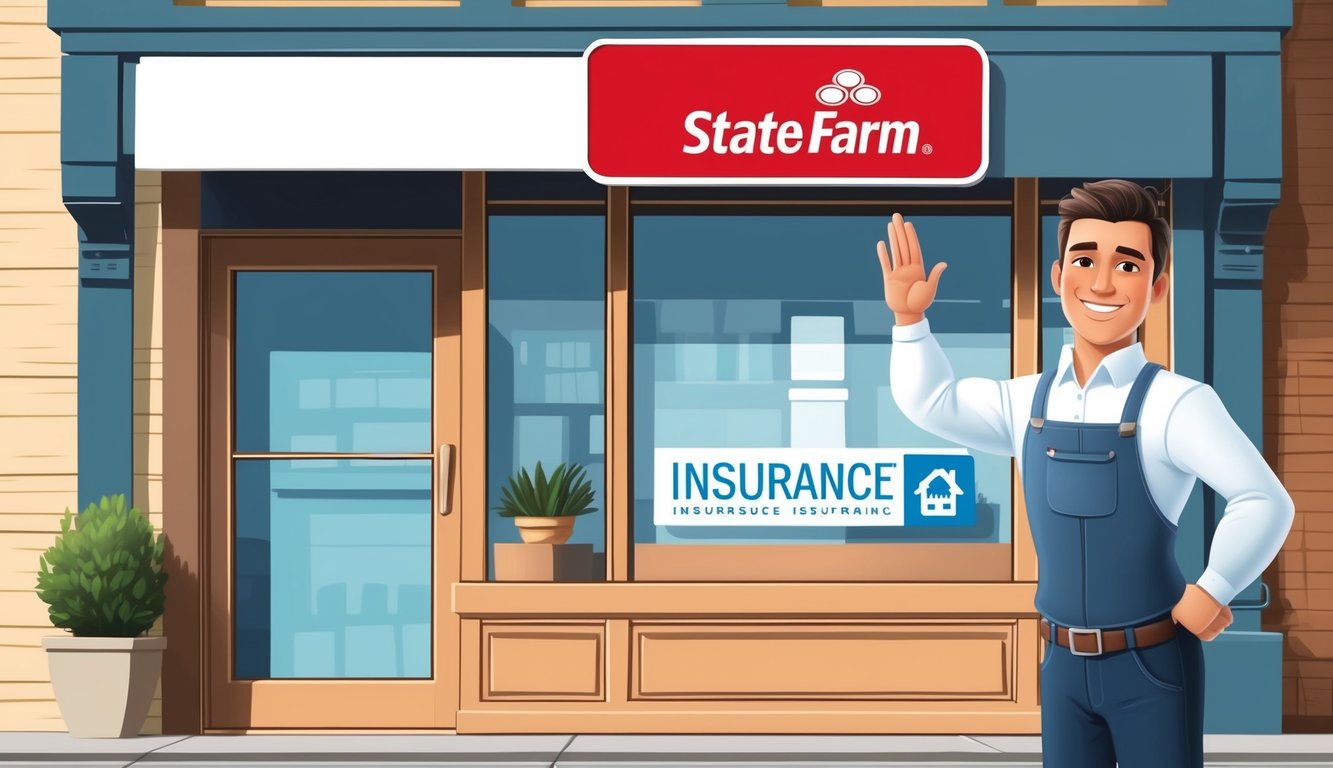Small business insurance provides crucial protection for entrepreneurs and company owners.
It safeguards your venture against potential risks and liabilities that could otherwise lead to financial ruin.
By investing in the right coverage, you can focus on growing your business with peace of mind.
Choosing the best small business insurance requires careful consideration of your specific needs and industry risks. You’ll want to evaluate different providers based on factors such as coverage options, cost, customer service, and financial stability.
Taking the time to compare insurers and policies can help ensure you get the most comprehensive protection at a competitive price.
1) Hiscox Small Business Insurance

Hiscox is a leading provider of small business insurance with over a century of experience.
The company offers a range of coverage options tailored to meet the unique needs of various professions.
You can easily obtain a quote and purchase insurance through Hiscox’s online platform.
This convenient process allows you to see options and pricing within minutes, making it simple to find the right coverage for your business.
Hiscox provides essential policies such as general liability insurance and business owner’s policies.
These coverages protect your company from common risks and potential financial losses.
One of Hiscox’s strengths is its competitive pricing.
The company often offers rates that compare favorably to other insurers in the market, potentially saving you money on your premiums.
Hiscox has received positive recognition for its financial stability.
The company holds an A (Excellent) rating from AM Best, indicating a strong ability to meet its claims obligations.
You can find coverage through Hiscox for hundreds of different professions.
This wide range of options ensures that whether you’re a consultant, retailer, or service provider, you can find a policy that fits your specific business needs.
If you prefer personalized assistance, Hiscox offers customer support via phone.
You can speak with a representative to discuss your insurance needs and get help selecting the right coverage for your business.
2) Next Insurance
Next Insurance offers tailored policies for thousands of professions.
As a small business owner, you can easily obtain insurance quotes online through their platform.
Their coverage options include general liability, professional liability, and commercial auto insurance.
Next Insurance also provides workers’ compensation and tools and equipment insurance to protect your business assets.
One of the advantages of choosing Next Insurance is the ability to bundle multiple policies.
By combining two or more policies, you can save up to 10% on your premiums.
The company’s digital platform allows you to manage your policies efficiently.
You can create and send certificates of insurance directly from their website or mobile app.
Next Insurance has received positive reviews for its comprehensive online business insurance options.
Their user-friendly interface makes it easy for you to purchase and manage your coverage.
When considering Next Insurance, you should compare their rates with other providers.
While they offer competitive pricing, it’s always wise to get quotes from multiple insurers to ensure you’re getting the best deal for your specific business needs.
Remember that insurance needs can vary significantly depending on your industry and business size.
Next Insurance’s customized approach aims to provide you with coverage that matches your unique requirements.
3) Progressive Commercial

Progressive Commercial offers a range of business insurance options to protect your small business from financial losses.
Their coverage includes general liability, professional liability, and workers’ compensation.
You can get a customized business insurance quote from Progressive Commercial tailored to your specific needs.
They aim to help you choose the best liability and commercial auto coverages for your business.
Progressive Commercial is part of Progressive, which is currently the No. 1 commercial auto insurer in America.
They have an A+ rating from A.M. Best, indicating strong financial stability and reliability.
With Progressive Commercial, you can insure your business vehicles alongside other coverage types.
They currently protect over 1 million commercial vehicles for hundreds of thousands of small businesses across the nation.
You can easily get a quote online or speak with an expert by phone.
Progressive Commercial also works with independent agents if you prefer personalized local assistance.
Their website provides resources to help you understand what business insurance is and how it works.
This can be valuable if you’re new to business insurance or looking to expand your coverage.
4) Nationwide Small Business Insurance
Nationwide offers a range of business insurance products to protect your company.
Their coverage options include general liability, property insurance, and business income protection.
One of Nationwide’s key offerings is the businessowners policy (BOP).
This package combines multiple coverages into one cost-effective solution, tailored to your specific industry needs.
When you choose Nationwide, you benefit from their financial stability.
The company has received high ratings from AM Best, indicating their ability to pay out claims reliably.
Nationwide takes a personal approach to customer service.
They can help you decide on the right policy to protect your business and future.
You can easily obtain a free business insurance quote from Nationwide’s website.
This allows you to explore your options without any commitment.
Nationwide offers more than a dozen business insurance products.
These include standard coverages as well as specialized options for specific industries.
By choosing Nationwide, you’re partnering with a leading provider of small business insurance.
Their comprehensive coverage can help prevent a bad day from becoming your business’s last day.
5) The Hartford Business Insurance
The Hartford offers a range of small business insurance options to protect your company.
Their coverage includes general liability, workers’ compensation, and commercial auto insurance.
When you choose The Hartford, you can customize your policy to fit your specific needs.
They understand that different businesses face unique risks and challenges.
The Hartford has been in business for over 200 years, providing insurance solutions to entrepreneurs and small business owners.
Their experience and longevity in the industry speak to their reliability.
You can easily get a quote online or speak with an insurance specialist to find the right coverage.
The Hartford aims to make the process of obtaining insurance straightforward and hassle-free.
Customer service is a priority for The Hartford.
They offer support from 8 am to 7 pm ET, ensuring you can reach them when you need assistance.
The Hartford boasts a 4.8/5 star claim experience rating, indicating high customer satisfaction with their claims process.
This suggests that if you need to file a claim, you can expect efficient and fair handling.
When considering The Hartford for your small business insurance needs, you can feel confident in their extensive experience and commitment to customer service.
Their range of coverage options allows you to tailor your policy to your business’s specific requirements.
6) Liberty Mutual Small Business Insurance
Liberty Mutual offers comprehensive insurance solutions for small businesses.
Their business owner’s policy (BOP) combines property and general liability coverage, providing essential protection for your company.
You can customize your policy by adding additional coverage options to meet your specific needs.
Liberty Mutual’s small business insurance includes protection for commercial auto, workers’ compensation, and professional liability.
The company’s dedicated wholesale market branch, Ironshore, specializes in providing excess and surplus insurance for businesses with complex or unique risks.
This can give you an edge if your business requires specialized coverage.
When filing a claim, the process varies depending on your policy type and business size.
Liberty Mutual offers property and casualty claims services for commercial auto and other business-related incidents.
To obtain small business insurance from Liberty Mutual, start by determining the coverage types you need.
You can begin with a basic BOP and add more coverage as necessary.
Liberty Mutual’s business insurance offerings have received positive ratings from industry experts.
They provide a full range of coverage options, including general liability and workers’ compensation, making them a solid choice for your small business insurance needs.
7) Travelers Business Insurance

Travelers offers a comprehensive range of small business insurance options tailored to various industries.
With over 165 years of experience, the company has built a strong reputation in the property casualty insurance sector.
When you choose Travelers, you gain access to coverage that can help protect your business from everyday risks.
Their policies include general liability, property insurance, and workers’ compensation.
Travelers stands out for its industry-specific coverage options.
Whether you run a restaurant, a retail store, or a professional services firm, you can find insurance solutions designed for your particular needs.
The company’s financial stability is noteworthy.
This means you can trust Travelers to have the funds available to pay claims when needed.
Reducing risk is a key focus for Travelers.
They not only provide insurance but also offer resources to help you prepare for potential risks and recover faster after unexpected events.
Travelers’ small business insurance is known for its flexibility.
You can customize your coverage to fit your specific business requirements, ensuring you’re not paying for unnecessary protection.
Customer service is another area where Travelers excels.
They provide support throughout the insurance process, from getting a quote to filing a claim.
While Travelers offers many benefits, it’s important to compare their rates with other providers to ensure you’re getting the best value for your business insurance needs.
8) Chubb Small Business Insurance

Chubb offers a comprehensive range of small business insurance options tailored to companies with up to $30 million in revenue.
Their coverage is designed to protect your business from various risks and potential financial losses.
As a century-old company, Chubb has built a reputation for superior underwriting expertise and world-class claims services.
You can benefit from their experience and financial strength when selecting insurance for your small business.
Chubb’s small business insurance products are crafted to fit the unique needs of different industries.
You can find coverage options for property, liability, workers’ compensation, and more.
One advantage of choosing Chubb is their commitment to open communication.
If you have questions or concerns about your policy, their team is readily available to assist you.
Chubb is recognized for its strong financial position, which can provide you with added peace of mind.
This strength ensures that they can fulfill their obligations to policyholders in times of need.
When considering Chubb for your small business insurance needs, you’ll have access to a diverse range of products.
Their offerings can be customized to address the specific risks associated with your industry and business size.
9) Allstate Business Insurance

Allstate offers a range of business insurance options to protect your company from financial damages caused by accidents, lawsuits, and other risks.
Their coverage includes property protection, liability insurance, and specialized policies tailored to specific industries.
You can obtain a Business Owners Policy (BOP) from Allstate, which combines property and liability coverage into one convenient package.
This policy is designed to meet the needs of small to medium-sized businesses, providing comprehensive protection at an affordable rate.
Allstate’s commercial auto insurance is a notable offering, as they are one of the top 10 largest providers in this category.
If your business relies on vehicles, this coverage can help protect your assets in case of accidents or damages.
When you choose Allstate for your business insurance needs, you’ll have access to their network of agents who can help you customize your coverage.
These professionals can guide you through the process of selecting the right policies for your specific business requirements.
Allstate’s business insurance is designed to safeguard your company’s property and assets.
Their policies can cover everything from equipment and inventory to legal expenses and lost income due to business interruptions.
While Allstate offers a solid range of business insurance options, it’s worth noting that their coverage may not be as extensive as some competitors.
However, for many small businesses, their offerings provide sufficient protection to mitigate common risks and financial uncertainties.
10) State Farm Small Business Insurance

State Farm offers a range of insurance options tailored for small businesses.
You can choose from various coverage types to protect your company’s assets and operations.
State Farm agents are small business owners themselves, giving them unique insight into your needs.
They can help you select the right coverage at a price that fits your budget.
You can get standard policies like commercial auto insurance and workers’ compensation through State Farm.
They also provide more specialized coverage options for specific industries.
State Farm’s business owners policy (BOP) combines property and liability coverage in one package.
This can be a cost-effective option for many small businesses.
To get started, you can contact a local State Farm business agent for a free quote.
They’ll assess your needs and recommend appropriate coverage.
State Farm is known for its financial stability, which can give you peace of mind.
You can trust that they’ll be able to pay out claims if needed.
Customer reviews indicate high satisfaction with State Farm’s business insurance.
Many appreciate the personalized service from local agents.
Keep in mind that while State Farm offers a wide range of coverage, they may not be the cheapest option.
It’s always wise to compare quotes from multiple insurers before making a decision.
Understanding Small Business Insurance
Small business insurance provides crucial protection for your company’s assets, employees, and operations.
It helps safeguard against financial losses from various risks and liabilities.
What Is Small Business Insurance?
Small business insurance is a group of policies designed to protect your company from potential financial losses.
It covers various risks associated with running a business, such as property damage, liability claims, and employee-related issues.
You can customize your coverage based on your specific needs.
This may include protection for your physical assets, like buildings and equipment, as well as intangible assets like your reputation and intellectual property.
Insurance providers offer flexible plans that can grow with your business.
As your company expands, you can adjust your coverage to match your changing needs.
Types of Coverage
Several types of small business insurance are available to address different risks:
- General Liability Insurance: Protects against third-party claims of bodily injury or property damage.
- Property Insurance: Covers damage to your business property and equipment.
- Professional Liability Insurance: Safeguards against claims of negligence or errors in your services.
- Workers’ Compensation: Provides benefits to employees who are injured or become ill due to work-related causes.
- Business Interruption Insurance: Helps replace lost income if your business is forced to close temporarily.
Some insurers offer comprehensive packages that combine multiple coverage types into a single policy, often called a Business Owner’s Policy (BOP).
Why It Is Important
Small business insurance is vital for protecting your company’s financial stability and longevity.
It helps you manage risks that could otherwise lead to significant losses or even bankruptcy.
Without proper coverage, you might have to pay out-of-pocket for legal fees, damages, or property repairs.
This can quickly deplete your resources and threaten your business’s survival.
Insurance also provides peace of mind, allowing you to focus on growing your business rather than worrying about potential risks.
It can enhance your credibility with clients and partners, demonstrating that you’re a responsible and stable business owner.
In some cases, insurance may be required by law or by clients before they’ll work with you.
Having the right coverage can open doors to new opportunities and contracts.
Factors to Consider When Choosing Insurance
Selecting the right insurance for your small business involves careful evaluation of your needs, policy options, and insurance providers.
These factors will help you make an informed decision to protect your business effectively.
Assessing Your Business Needs
Start by analyzing your business’s specific risks and requirements.
Consider the type of business you operate and the potential liabilities you face.
Evaluate your assets, including property, equipment, and inventory.
Think about your workforce size and the nature of their tasks.
Identify any industry-specific risks that may require specialized coverage.
For example, a restaurant might need food contamination insurance, while a tech company may require cyber liability coverage.
Don’t forget to account for your business location and any legal requirements in your area.
Some states mandate certain types of insurance for businesses.
Comparing Policies
Once you’ve identified your needs, research different policy types.
Common options include:
- General Liability Insurance
- Property Insurance
- Professional Liability Insurance
- Workers’ Compensation
- Business Interruption Insurance
Business Owner’s Policies (BOPs) combine multiple coverages and can be cost-effective for small businesses.
Compare coverage limits, deductibles, and exclusions across policies.
Pay attention to policy terms and conditions.
Look for any gaps in coverage that might leave your business vulnerable.
Consider adding endorsements or riders to tailor the policy to your specific needs.
Evaluating Insurance Providers
Choose a reputable insurance provider with experience in your industry.
Look for companies with strong financial ratings from independent agencies.
This ensures they can fulfill claims if needed.
Compare quotes from multiple insurers to find competitive rates.
However, don’t base your decision solely on price.
Consider the insurer’s customer service reputation and claims process efficiency.
Ask about discounts for bundling policies or implementing safety measures.
Some providers offer specialized packages for specific industries or business sizes.
Review the insurer’s claims handling process and support services.
A provider that offers risk management resources can help you prevent losses and reduce premiums over time.
Cost of Small Business Insurance
Small business insurance costs vary widely based on several factors.
The average monthly premium is around $300, but this can fluctuate significantly depending on your specific circumstances and coverage needs.
Factors Influencing Costs
Business type plays a crucial role in determining insurance costs.
High-risk industries like construction typically face higher premiums compared to low-risk sectors such as consulting.
Company size also impacts pricing.
Larger businesses with more employees and assets generally pay more for coverage.
Location matters too.
Operating in areas prone to natural disasters or high crime rates can increase insurance expenses.
Coverage limits and deductibles significantly affect premiums.
Higher coverage limits raise costs, while higher deductibles can lower them.
Claims history is another key factor.
Businesses with a history of frequent claims may face higher premiums.
Tips to Reduce Premiums
Bundling policies can lead to substantial savings.
Many insurers offer discounts when you purchase multiple types of coverage from them.
Implementing safety measures in your workplace can lower risks and potentially reduce premiums.
For example, you can install security systems and conduct regular safety training.
Choosing higher deductibles can decrease your monthly costs.
However, make sure you can afford the higher out-of-pocket expense if you need to file a claim.
Regularly reviewing and updating your coverage helps avoid overpaying for unnecessary protection.
As your business evolves, your insurance needs may change.
Shopping around and comparing quotes from multiple providers can help you find the best rates.
Also, don’t hesitate to negotiate with insurers for better terms.






